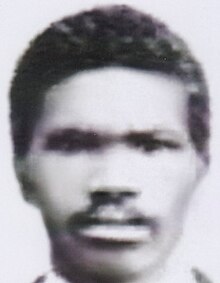John Boston (ca. 1832–after 1880) was an American politician. He was enslaved before becoming a representative from Darlington County in the South Carolina House of Representatives during the Reconstruction era. He helped establish the Lamar Colored Methodist Church in 1865.

Early life
Boston was born into slavery around 1832 in Lisbon Township (now Lamar, South Carolina) in Darlington County, South Carolina.
Career
In 1865, Boston founded the Lamar Colored Methodist Episcopal Church. He served as the church's minister from 1865 to 1867. The initial church services were held under a brush arbor until 1866, when the construction of the church was completed. The church is now the John Wesley Methodist Church.
In 1873, he attended the South Carolina Conference of the Methodist Episcopal Church. He was from Timmonsville, which is about 9 miles from Lamar. Boston was a school trustee, community supporter, and a real estate investor.
He represented Darlington County in the South Carolina House of Representatives from 1868 to 1870 and again from 1872 to 1874. In 1868, there were four representatives from Darlington, three of whom were colored: John Boston, Alfred Rush, and Jordan Lang. The white representative was G. Holliman. Boston was particularly focused on judicial integrity and civil rights. He lobbied for children of his constituents to gain acceptance to the University of South Carolina. For instance, R. Marcus Dubose was accepted in December 1869. Boston was a farmer by 1880 in the town of Lisbon in Boston Township, a former Darlington County township that was named after him.
Personal life
Boston and his wife, Lucy A. Boston, had eight children: Henry, Cornelius, George, Ronnie, Jane, John H., J. Johnson, and Mary.
Boston was buried in what is now the John Wesley Methodist Church cemetery.
See also
References
- ^ "Reconstruction Era 1865–1877: Representative John Boston". Darlington County Cultural Realism Complex. Archived from the original on 2022-07-06. Retrieved 2021-03-29.
- ^ "John Boston, Lisbon, Darlington, South Carolina", Tenth Census of the United States, 1880. Records of the Bureau of the Census, Record Group 29. (NARA microfilm publication T9, 1,454 rolls) Roll: 1227; Page: 204A; Enumeration District: 040, Washington, D.C.: National Archives, 1880
- "2018' Directors Corner". www.culturalrealismvision.com. Archived from the original on 2022-01-02. Retrieved 2021-03-30.
- ^ "African American Historic Places in South Carolina" (PDF). State Historic Preservation Office, South Carolina Department of Archives and History. September 2015. p. 40. Retrieved 2021-03-29.
- "Minutes of the Annual Conferences of the Methodist Episcopal Church". T. Mason and G. Lane. 1873. Retrieved 2021-03-30.
- "Lamar to Timmonsville". Google maps. Retrieved 2021-03-30.
- Work, Monroe N.; Staples, Thomas S.; Wallace, H. A.; Miller, Kelly (January 1920). "Some Negro Members of Reconstruction Conventions and Legislatures and of Congress". The Journal of Negro History. 5 (1). The University of Chicago Press on behalf of the Association for the Study of African American Life and History: 86. doi:10.2307/2713503. JSTOR 2713503. S2CID 149610698.
- 1830s births
- People from Darlington County, South Carolina
- African-American state legislators in South Carolina
- Members of the South Carolina House of Representatives
- People of the African Methodist Episcopal church
- African-American politicians during the Reconstruction Era
- 19th-century members of the South Carolina General Assembly